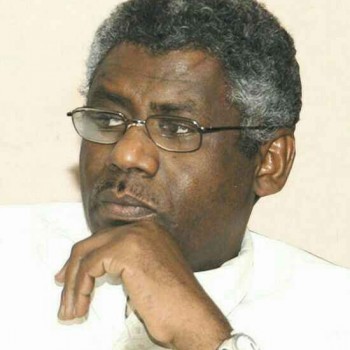Why Will the Parallel Government Plan Fail?

As I See
Adil El-Baz
1
The immediate reason is poor judgment driven by foolishness, which has led to failure in everything since the war began. The “sponsor” remains lost in his own maze. The coup failed despite having all the necessary elements—soldiers, weapons, and endless supplies. The media was mobilized in its favor, and vast amounts of money were spent without fear of poverty or divine accountability. Yet, what was the result? The coup failed, leading to war; the war failed, leading to an invasion; the invasion failed, leading to revenge and destruction; and revenge and destruction failed to subjugate the people. Now, the “sponsor” has resorted to attempting to divide the country.
2
The “sponsor” rushed to arrange for an illegitimate government to cover up the continuous defeats of his militias on the battlefield. Instead of the media focusing on these defeats and the collapse of militia morale, the “sponsor” devised a plan to shift attention to the farce of the illegitimate government in Nairobi. But the plan backfired. While cameras covered the trivial event in the “Kenyatta” hall, they simultaneously captured battles in central Khartoum and East Nile, as well as the army’s victories in Kordofan. Thus, few people cared about those dancing on the stage of absurdity.
3
The second objective behind forming this illegitimate government was to replicate the Libyan model: establish a government by any means and then seek regional and international recognition. However, this goal has also been thwarted and will amount to nothing, no matter what the “sponsor” does. Why?
4
When the “sponsor’s” militias claimed to control 80% of the country, they still failed to establish a government in any of the areas they occupied. Even in their strongholds, people fled, leaving those areas deserted for the Janjaweed. When the militias attempted to set up a fake administration in occupied areas like Al-Jazira, they failed. The same happened in Khartoum, where they presented a remarkable example of an illegitimate government under “Baqal,” the so-called “Governor-General of Khartoum”!
5
The “Taaishi” government and those living off it have no place where they can establish their so-called authority, enforce their “despicable secular constitution,” or gather their mercenaries. Any location they choose in Darfur will be targeted by the army, which is now advancing to encircle all cities occupied by the militias. Therefore, Darfur is not a safe option for the “Taaishi” government.
6
The militias and their new ally, Abdelaziz al-Hilu, may try to establish this illegitimate government in one of the mountain hideouts known as “Karakeer.” It is said that there are 99 mountains with thousands of such hideouts. Perhaps the militia’s government will find a cave to hide in, running its affairs from there while the rest of the mountains remain under al-Hilu’s control! I can’t help but imagine Al-Nour Hamad sitting between Al-Hilu, “Dagalo,” and “Burmah” in one of these hideouts, lecturing Al-Hilu on the “Second Message,” explaining to Abdul Rahim Dagalo the essence of the “pastoral mind,” and clarifying to Burmah Nasser the views of Mahmoud Mohamed Taha on sectarianism!
7
Unfortunately for them, even this dream seems impossible. The mountain people will revolt against Al-Hilu because they do not trust the Janjaweed. In fact, resistance has already begun among the youth and political figures in the region, as they reject this move and are now working on forming a political-military alliance against Al-Hilu—one that will significantly alter the balance of power in the mountains.
8
The militia and its backers had hoped that the illegitimate government would gain immediate international recognition, enabling it to exercise authority and implement plans to divide Sudan. But they were taken by surprise. Africa has largely rejected and condemned the parallel government. The latest such stance came from the International Conference on the Great Lakes Region, which reaffirmed its opposition to forming a parallel government in Sudan. The Arab League also rejected it, along with influential regional powers like Egypt, Saudi Arabia, and Qatar. The international response was even more decisive—UN Secretary-General António Guterres refused to recognize the parallel government, followed by the U.S. government, which stated that such a move would only exacerbate the conflict and hinder peace and stability in Sudan. Some European nations also expressed concern about this development.
9
Even China and Russia oppose the idea of a parallel government in Sudan. So, who will recognize and deal with this government, which was formed by forces accused of genocide? The only potential supporters are Chad, the Central African Republic, Libya, and possibly Kenya. The UAE might engage with it unofficially, as could South Sudan. However, in the end, those relying on this government will not secure recognition from any major international or regional organization.
10
Thus, “Taaishi” will become the leader of a government much like “Baqal’s,” wandering from alley to alley and from one mountain hideout to another, preaching Al-Hilu’s secularism, the Janjaweed’s version of democracy, and the freedoms promised by Burmah Nasser, the supposed head of the Sovereignty Council, in his bizarre sectarian-secular-militia-led state—under the full sponsorship of the “Democratic Sponsor”!



